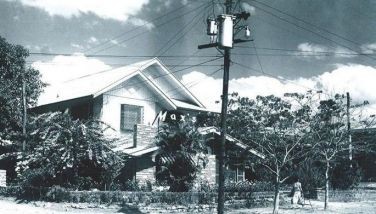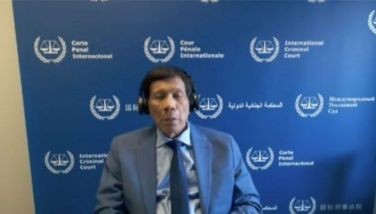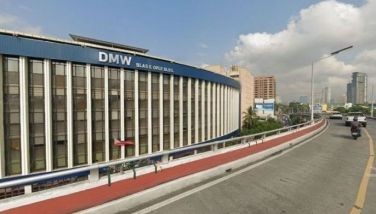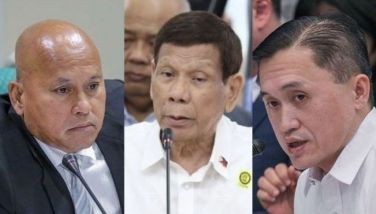Light at end of Busan tunnel

November 28, 2006 | 12:00am
the forecast was the Philippines would bring home four to 10 gold medals from the 14th Asian Games in Busan four years ago.
But the contingent of 218 athletes couldn’t get the job done. They spilled their guts out on the field of competition and deserved credit for their efforts. Unfortunately, there were lots of negatives that tainted the Philippine participation.
A cloud of doubt surrounded the assignment of players in billiards. Why weren’t Bata Reyes and Django Bustamante entered in the 9-ball singles competitions? Why was Bustamante relegated to a single event — doubles at that?
John Lozada failed to list up in his track event.
Swimmer Carlo Piccio arrived late as he was stranded in Japan because of a typhoon. Should his airline ticket have been sent earlier by the Philippine Sports Commission? Piccio swam in only one event. Was it worth the trip all the way from Cincinnati to Busan?
An overflow of sports "officials" did virtually nothing but occupy space and demoralize athletes. What about the shameful performance of a baseball team that had no business being in Busan? And there was a waste of precious dollars to send single entries in tennis and table tennis — if exposure was the objective, it wasn’t achieved.
Since the first Asiad in 1951, the Philippines has averaged four gold medals each staging. In Busan, the three gold medals were below par.
Losing to Southeast Asian neighbors Malaysia, Indonesia, Singapore and Vietnam in the gold medal race was another downer. The Philippines was also humbled by Hong Kong and Qatar in the medal stakes.
Looking at the positive side, there were several reasons to celebrate.
The Philippines eclipsed its medal haul of a gold, five silvers and 12 bronzes in Bangkok four years before. In Busan, the count was three golds, seven silvers and 16 bronzes.
In Bangkok, the Philippines tumbled to 21st place in the gold medal standings. In Busan, it rebounded to No. 18. In terms of total medals, the Philippines ranked No. 12, beating Southeast Asian rivals Malaysia, Indonesia, Singapore and Vietnam.
There were four disciplines that clinched medals in Busan but didn’t in Bangkok. The "new" discoveries were shooting, rowing, karate and equestrian. The only sports where the Philippines took medals in Bangkok but didn’t in Busan were cycling and swimming. So in the final reckoning, it was a net gain.
In Bangkok, the Philippines sent 258 athletes and produced a total of 18 medals. In Busan, the delegation listed 218 athletes — 40 less than four years earlier — but was more productive with 26 medals.
Several Philippine records, particularly in swimming, were set in Busan even as they weren’t reflected in the medal standings. Filipinos were blanked in track and field but their showing was, in several events, the best in Southeast Asia.
It was also the first three-sport gold harvest for the Philippines since the 1986 Asiad in Seoul. The feat ended a long wait of 16 years. Surely, that was a positive sign because it meant progress in the development of other sports.
Boxing finally broke out of its rut and clinched a silver, thanks to lightflyweight Harry Tanamor. Wushu provided hope for the future with two silvers and three bronzes compared to two silvers and two bronzes in Bangkok.
More importantly, a slew of youngsters showed promise as future medal winners. Aquatics was bannered by teenagers. Most of the bowlers were in their 20s. Six of the boxers were Asiad rookies. Two equestriennes were in their teens. The youth brigade was clearly on the rise, brightening the outlook for Philippine sports.
"Although we didn’t meet our minimum of five golds, we did have our best finish in 16 years and it gave our nation something to be joyful for in a sense that our athletes showed they could improve further," said former Philippine Olympic Committee president Celso Dayrit.
The golds were delivered by equestrienne Mikee Cojuangco-Jaworski, the 9-ball billiard doubles team of Bustamante and Antonio Lining and the men’s bowling pair of Paeng Nepomuceno and R. J. Bautista.
The basketball team, coached by Joseph Uichico, was a disappointment. The cagers were within a whisker of a sure silver when host South Korea spoiled the advance to the finals. The Filipinos were on top by two, time down to 23.9 seconds, and Olsen Racela could’ve iced it with two free throws but missed both. Although the Philippines had two fouls to give, they failed to capitalize and Lee Sang Min buried a triple at the buzzer to win it, 69-68. South Korea went on to shock China, 102-100, in overtime for the gold medal while the Philippines lost a 68-66 decision to Kazakhstan in the playoff for the bronze.
The cagers were Noy Castillo, Racela, Dondon Hontiveros, Dennis Espino, Mick Pennisi, Eric Menk, Danny Ildefonso, Andy Seigle, Jeffrey Cariaso, Rudy Hatfield, Asi Taulava and Kenneth Duremdes.
Because of the Philippines‚ continued suspension by FIBA (Federation Internationale de Basketball), the national team is disqualified from participating in Doha this year. It marks the first time in the Asian Games the Philippines will not play the sport that millions of Filipinos love with a passion.
Hopes are high that in Doha, the Philippines will surpass its medal count in Busan four years ago. The roster of 229 athletes in 31 of 39 sports is deep, talented and full of promise. Inspiring the cast is the country’s impressive showing in the Southeast Asian Games last year. No doubt, the momentum generated by the unprecedented feat of topping the 11-nation joust will spur the athletes to achieve more than what is expected.
But the contingent of 218 athletes couldn’t get the job done. They spilled their guts out on the field of competition and deserved credit for their efforts. Unfortunately, there were lots of negatives that tainted the Philippine participation.
A cloud of doubt surrounded the assignment of players in billiards. Why weren’t Bata Reyes and Django Bustamante entered in the 9-ball singles competitions? Why was Bustamante relegated to a single event — doubles at that?
John Lozada failed to list up in his track event.
Swimmer Carlo Piccio arrived late as he was stranded in Japan because of a typhoon. Should his airline ticket have been sent earlier by the Philippine Sports Commission? Piccio swam in only one event. Was it worth the trip all the way from Cincinnati to Busan?
An overflow of sports "officials" did virtually nothing but occupy space and demoralize athletes. What about the shameful performance of a baseball team that had no business being in Busan? And there was a waste of precious dollars to send single entries in tennis and table tennis — if exposure was the objective, it wasn’t achieved.
Since the first Asiad in 1951, the Philippines has averaged four gold medals each staging. In Busan, the three gold medals were below par.
Losing to Southeast Asian neighbors Malaysia, Indonesia, Singapore and Vietnam in the gold medal race was another downer. The Philippines was also humbled by Hong Kong and Qatar in the medal stakes.
Looking at the positive side, there were several reasons to celebrate.
The Philippines eclipsed its medal haul of a gold, five silvers and 12 bronzes in Bangkok four years before. In Busan, the count was three golds, seven silvers and 16 bronzes.
In Bangkok, the Philippines tumbled to 21st place in the gold medal standings. In Busan, it rebounded to No. 18. In terms of total medals, the Philippines ranked No. 12, beating Southeast Asian rivals Malaysia, Indonesia, Singapore and Vietnam.
There were four disciplines that clinched medals in Busan but didn’t in Bangkok. The "new" discoveries were shooting, rowing, karate and equestrian. The only sports where the Philippines took medals in Bangkok but didn’t in Busan were cycling and swimming. So in the final reckoning, it was a net gain.
In Bangkok, the Philippines sent 258 athletes and produced a total of 18 medals. In Busan, the delegation listed 218 athletes — 40 less than four years earlier — but was more productive with 26 medals.
Several Philippine records, particularly in swimming, were set in Busan even as they weren’t reflected in the medal standings. Filipinos were blanked in track and field but their showing was, in several events, the best in Southeast Asia.
It was also the first three-sport gold harvest for the Philippines since the 1986 Asiad in Seoul. The feat ended a long wait of 16 years. Surely, that was a positive sign because it meant progress in the development of other sports.
Boxing finally broke out of its rut and clinched a silver, thanks to lightflyweight Harry Tanamor. Wushu provided hope for the future with two silvers and three bronzes compared to two silvers and two bronzes in Bangkok.
More importantly, a slew of youngsters showed promise as future medal winners. Aquatics was bannered by teenagers. Most of the bowlers were in their 20s. Six of the boxers were Asiad rookies. Two equestriennes were in their teens. The youth brigade was clearly on the rise, brightening the outlook for Philippine sports.
"Although we didn’t meet our minimum of five golds, we did have our best finish in 16 years and it gave our nation something to be joyful for in a sense that our athletes showed they could improve further," said former Philippine Olympic Committee president Celso Dayrit.
The golds were delivered by equestrienne Mikee Cojuangco-Jaworski, the 9-ball billiard doubles team of Bustamante and Antonio Lining and the men’s bowling pair of Paeng Nepomuceno and R. J. Bautista.
The basketball team, coached by Joseph Uichico, was a disappointment. The cagers were within a whisker of a sure silver when host South Korea spoiled the advance to the finals. The Filipinos were on top by two, time down to 23.9 seconds, and Olsen Racela could’ve iced it with two free throws but missed both. Although the Philippines had two fouls to give, they failed to capitalize and Lee Sang Min buried a triple at the buzzer to win it, 69-68. South Korea went on to shock China, 102-100, in overtime for the gold medal while the Philippines lost a 68-66 decision to Kazakhstan in the playoff for the bronze.
The cagers were Noy Castillo, Racela, Dondon Hontiveros, Dennis Espino, Mick Pennisi, Eric Menk, Danny Ildefonso, Andy Seigle, Jeffrey Cariaso, Rudy Hatfield, Asi Taulava and Kenneth Duremdes.
Because of the Philippines‚ continued suspension by FIBA (Federation Internationale de Basketball), the national team is disqualified from participating in Doha this year. It marks the first time in the Asian Games the Philippines will not play the sport that millions of Filipinos love with a passion.
Hopes are high that in Doha, the Philippines will surpass its medal count in Busan four years ago. The roster of 229 athletes in 31 of 39 sports is deep, talented and full of promise. Inspiring the cast is the country’s impressive showing in the Southeast Asian Games last year. No doubt, the momentum generated by the unprecedented feat of topping the 11-nation joust will spur the athletes to achieve more than what is expected.
BrandSpace Articles
<
>
- Latest
- Trending
Trending
Latest
Trending
Latest
Recommended





























